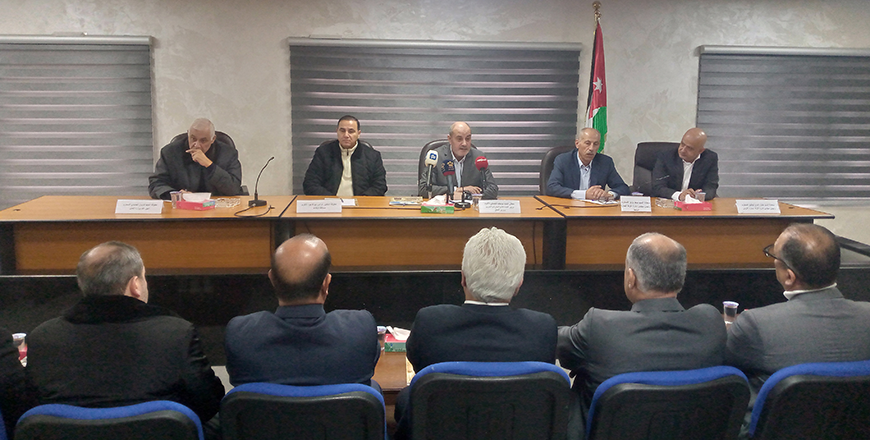You are here
Gov't continues work to expedite path to modernisation — Shamali
By JT - Jan 15,2023 - Last updated at Jan 15,2023

Minister of Industry, Trade and Supply and Minister of Labour Yousef Shamali meets with the boards of directors of the Salt and Southern Shouneh Chambers of Commerce during a tour of the areas on Saturday (Petra photo)
AMMAN — Minister of Industry, Trade and Supply and Minister of Labour Yousef Shamali on Saturday affirmed that the government continues to drive through its political, economic and administrative reforms, in implementation of the vision and directives of His Majesty King Abdullah, the Jordan News Agency, Petra, reported.
Touring Salt and Southern Shouneh, Shamali met with the boards of directors of the Salt and Southern Shouneh Chambers of Commerce.
During his meeting, he referred to the completion of the new political legislation and the launch of the Economic Modernisation Vision, adding that work is underway to finalise the administrative modernisation plan.
The executive plan, which comes as a practical translation of the Economic Modernisation Vision, will feature 183 initiatives and 418 priorities, with a total cost of JD2.3 billion until the end of 2025, of which JD670 million will be allocated for 2023, Shamali said.
The plan seeks to raise the growth rate of Jordan’s GDP at constant prices to 3 per cent, gradually increasing the volume of exports to approximately JD9,713 million and net direct foreign investment to approximately JD1,092 million, he added.
The vision also aims to provide one million job opportunities and investments worth about JD41 billion, in partnership with the private sector.
Meetings with various chambers of commerce coincide with the new investment environment law entering into force, he said.
The new law aims to provide a supportive environment for existing investments and create attractive conditions for investment, in implementation of the Economic Modernisation Vision, he added.
He stressed the importance of the outputs of the meetings with the private sector, adding that it is crucial to build on them to serve the national economy, increase economic growth, confront challenges and overcome the consequences of global crises such as the spread of the Coronavirus pandemic and the Russian-Ukrainian war.
Shamali said that more than 42 per cent of businesses and investments are licensed directly, to facilitate and expedite licensing procedures in all governorates.
In regard to reducing unemployment, Shamali said that work is underway to benefit from the national employment programme as well as training programmes offered by the Vocational Training Corporation and the Technical and Vocational Skills Development Commission.
More than 15,000 Jordanians have been employed within the national employment programme, he highlighted.
The minister instructed the concerned authorities to implement training programmes targeting the people of Salt and Southern Shouneh, equipping them with skills needed for a number of vocational specialisations, such as maintenance of hybrid vehicles, sewing, and agriculture.
He affirmed the readiness of the Ministries of Industry and Labour to aid business owners in marketing their products at the Civil Service Consumer Corporation, exhibitions and fairs.
He described performance of the Jordanian commercial sector during the coronavirus pandemic as a “success story”, noting that there was no shortage of any commodity and that supply chains continued to operate as usual.
In turn, Chairman of the Jordan and Amman Chambers of Commerce Khalil Haj Tawfiq, stressed the importance of institutionalised partnership between public and private sectors to achieve economic reform.
He also voiced the readiness of the Jordan Chamber of Commerce and the rest of Chambers of Commerce in the Kingdom to contribute to efforts to reduce unemployment by providing training programmes in several fields.
Related Articles
AMMAN — Minister of Industry, Trade, Supply and Labour Yousef Shamali stressed the government's readiness to address the challenges facing t
AMMAN — Head of the Jordan Chamber of Commerce (JCC) Khalil Haj Tawfiq on Sunday said that the JCC will play a major role in achieving the g
AMMAN — The government is committed to maintaining the prices of bread in spite of global price hikes, and has allocated JD277 million in th


















